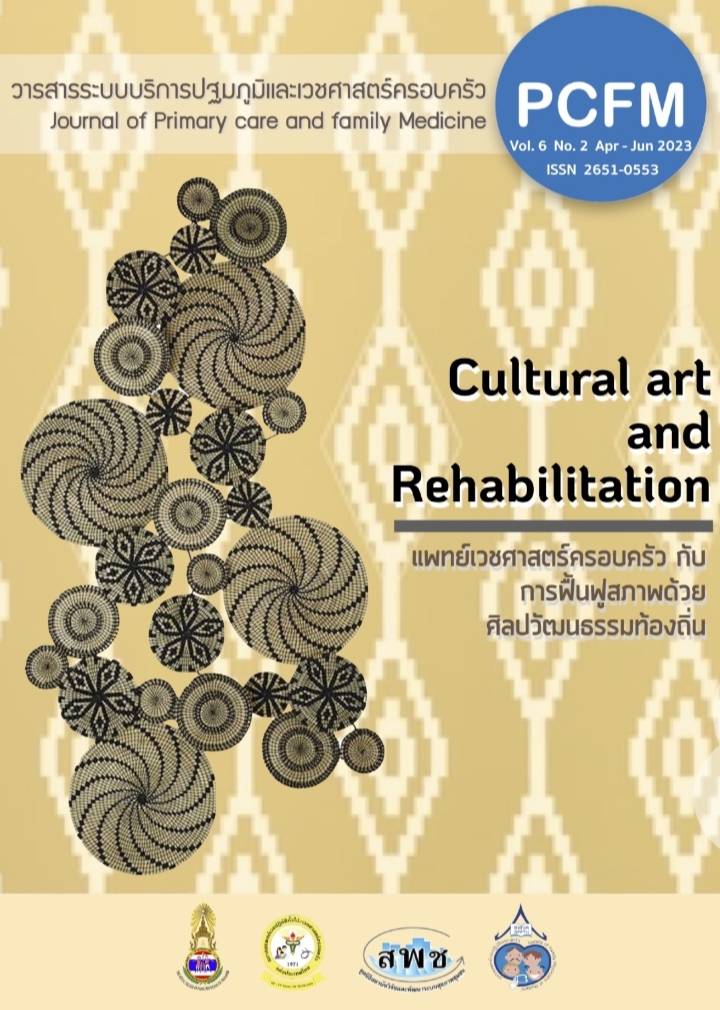ความชุกและปัจจัยที่มีความสัมพันธ์กับภาวะซึมเศร้าในสถานการณ์การแพร่ระบาดโรคโควิด-19 ของประชาชนเขตศูนย์แพทย์ชุมชนเมือง 2 โรงพยาบาลมหาราชนครราชสีมา จังหวัดนครราชสีมา
Main Article Content
บทคัดย่อ
ที่มา: ความชุกของภาวะซึมเศร้าช่วงการระบาดของโรคโควิด-19 ในต่างประเทศแตกต่างจากประเทศไทยที่มีความชุกน้อยกว่ามาก จึงสนใจศึกษาเพื่อทราบขนาดของปัญหาปัจจุบัน และวางแผนในการดูแลต่อไป
วัตถุประสงค์: เพื่อทราบความชุกและปัจจัยที่สัมพันธ์กับภาวะซึมเศร้าในสถานการณ์การแพร่ระบาดโรคโควิด-19
แบบวิจัย: เป็นการศึกษาวิจัยเชิงพรรณนาแบบตัดขวาง ในศูนย์แพทย์ชุมชน มีผู้เข้าร่วมจำนวน 367 คน ช่วงวันที่ 1 เมษายน ถึง 30 มิถุนายน 2565 ใช้เครื่องมือเป็นแบบประเมินภาวะซึมเศร้าด้วยแบบประเมิน 9 คำถาม (PHQ-9) วิเคราะห์ความสัมพันธ์โดยใช้สถิติ Multiple Logistic Regression
ผลการศึกษา: ความชุกของภาวะซึมเศร้าเป็นร้อยละ 11.99 ปัจจัยที่สัมพันธ์ คือ รายจ่ายต่อเดือน 10,000 บาทขึ้นไป การมีหนี้สิน การออกกำลังกายในช่วงการระบาดโรคโควิด-19 การเป็นผู้ดูแลหลักในครอบครัว รวมถึงมีความกังวลในกรณีชุมชนมีผู้ติดเชื้อและมาตรการควบคุมการติดเชื้อของรัฐบาล
สรุป: การแพร่ระบาดโรคโควิด-19 มีผลต่อความชุกของภาวะซึมเศร้า ควรมุ่งเน้นการคัดกรองและเฝ้าระวังภาวะซึมเศร้าในสถานการณ์ดังกล่าว
Article Details

อนุญาตภายใต้เงื่อนไข Creative Commons Attribution-NonCommercial-NoDerivatives 4.0 International License.
เนื้อหาและข้อมูลในบทความที่ลงตีพิมพ์ในวารสาร PCFM ถือเป็นข้อคิดเห็นและความรับผิดชอบของผู้เขียนบทความโดยตรง ซึ่งกองบรรณาธิการวารสารไม่จำเป็นต้องเห็นด้วยหรือร่วมรับผิดชอบใด ๆ
บทความ ข้อมูล เนื้อหา รูปภาพ ฯลฯ ที่ได้รับการตีพิมพ์ลงในวารสาร PCFM ถือเป็นลิขสิทธิ์ของวารสาร PCFM หากบุคคลหรือหน่วยงานใดต้องการนำทั้งหมดหรือส่วนหนึ่งส่วนใดไปเผยแพร่ต่อหรือเพื่อกระทำการใด ๆ จะต้องได้รับอนุญาตเป็นลายลักษณ์อักษรจากวารสาร PCFM ก่อนเท่านั้น
เอกสารอ้างอิง
Lu R, Zhao X, Li J, Niu P, Yang B, Wu H, et al. Genomic characterization and epidemiology of 2019 novel coronavirus: implications for virus origins and receptor binding. Lancet 2020; 395(10224):565-574.
United Nations. The Social Impact of COVID-19 [Internet]. 2020 [cited 2022 February 9]. Available from: https://www.un.org/development/desa/dspd/2020/04/social-impact-of-covid-19.
กรมควบคุมโรค กระทรวงสาธารณสุข. สถานการณ์ผู้ติดเชื้อ COVID-19 อัพเดทรายวัน. [อินเทอร์เน็ต]. 2565 [เข้าถึงเมื่อ 9 กุมภาพันธ์ 2565]. เข้าถึงได้จากจาก: https://ddc.moph.go.th/covid19-dashboard.
สำนักงานจังหวัดนครราชสีมา. เกาะติดสถานการณ์ นครราชสีมา COVID-19. [อินเทอร์เน็ต]. 2565 [เข้าถึงเมื่อ 9 กุมภาพันธ์ 2565]. เข้าถึงได้จากจาก: https://covid-19.nakhonratchasima.go.th/frontpage.
คำสั่งจังหวัดนครราชสีมา. มาตรการในการเฝ้าระวัง ป้องกัน และควบคุมการแพร่ระบาดของโรคติดเชื้อไวรัสโคโรนา 2019 (โควิด-19) สำหรับพื้นที่ควบคุมของจังหวัดนครราชสีมา (ฉบับที่ 2). [อินเทอร์เน็ต]. 2565 [เข้าถึงเมื่อ 9 กุมภาพันธ์ 2565]. เข้าถึงได้จากจาก: https://covid-19.nakhonratchasima.go.th/files/com_announce/2022-01_c0952e98419cb6d.pdf.
Bäuerle A, Teufel M, Musche V, Weismüller B, Kohler H, Hetkamp M, et al. Increased generalized anxiety, depression and distress during the COVID-19 pandemic: a cross-sectional study in Germany. J Public Health (Oxf) 2020;42(4):672-678.
Shah SMA, Mohammad D, Qureshi MFH, Abbas MZ, Aleem S. Prevalence, psychological responses and associated correlates of depression, anxiety and stress in a global population, during the coronavirus disease (COVID-19) pandemic. Community Mental Health J 2021;57(1):101-110.
ธนาสิทธิ์ วิจิตราพันธ์. ความชุกและปัจจัยที่เกี่ยวข้องกับความเครียดและภาวะซึมเศร้าในสถานการณ์แพร่ระบาดโรคโควิด-19 ของประชาชนเขตคลินิกหมอครอบครัวบ้านทุ่งเสี้ยว อำเภอสันป่าตอง จังหวัดเชียงใหม่. วารสารสุขภาพจิตแห่งประเทศไทย 2564; 29(1): 12-21.
วรินทิพย์ สว่างศรี, นันทยุทธ หะสิตะเวช, ชลธิชา แย้มมา, ณัฐปพน รัตนตรัย, ดุษฎี จึงศิรกุลวิทย์. ความชุกของการรับรู้ความเครียด ภาวะซึมเศร้า และปัจจัยที่เกี่ยวข้องในผู้ป่วยโรคโควิด 19 เขตกรุงเทพมหานคร. วารสารสุขภาพจิตแห่งประเทศไทย 2564; 29(2): 114-124.
สำนักส่งเสริมและพัฒนาสุขภาพจิต กรมสุขภาพจิต. แนวทางการใช้เครื่องมือด้านสุขภาพจิตสำหรับบุคลากรสาธารณสุข ในโรงพยาบาลชุมชน (คลินิกโรคเรื้อรัง) ฉบับปรับปรุง. พิมพ์ครั้งที่ 2. นนทบุรี: โรงพิมพ์ชุมนุมสหกรณ์การเกษตรแห่งประเทศไทย จำกัด; 2558.
ศูนย์ปฏิบัติการภาวะฉุกเฉิน กรมควบคุมโรค. รายงานสถานการณ์โรคติดเชื้อไวรัสโคโรนา 2019 ฉบับที่ 210วันที่ 31 กรกฎาคม 2563 เวลา 12.00 น. [อินเทอร์เน็ต]. 2563 [เข้าถึงเมื่อ 9 กุมภาพันธ์ 2565]. เข้าถึงได้จากจาก: https://ddc.moph.go.th/viralpneumonia/file/situation/situation-no210-310763.pdf.


